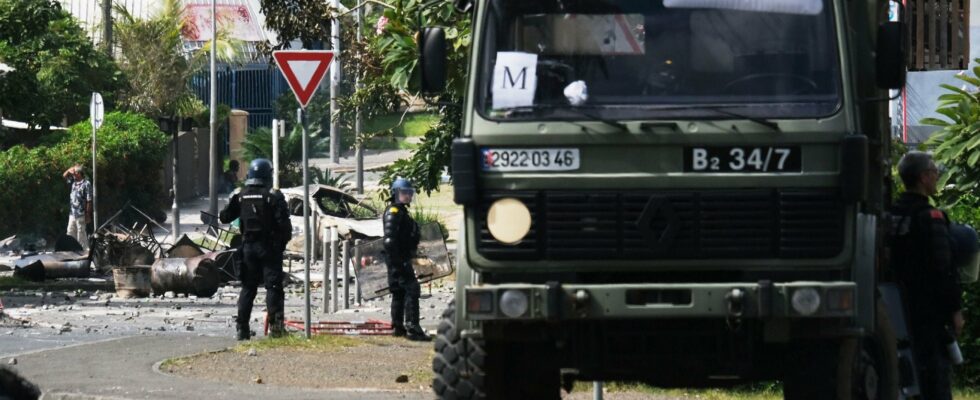Detonations, buildings on fire, businesses looted, hundreds of injured, including law enforcement officers, and already three dead. New Caledonia has been on fire for 48 hours. Despite the curfew in place since Monday, the serious violence, which affected the entire archipelago, resumed Tuesday evening after dark and the authorities fear a new outbreak during the night from Wednesday to Thursday. “We are in a situation that I would describe as insurrectional,” worried Louis Le Franc, High Commissioner of the Republic. “It must be time for appeasement […] the call for calm is imperative.”
These riots started on Monday on the sidelines of a constitutional revision, rejected by the separatists. The text voted on by the senators and last night by the deputies aims to expand the electorate in the provincial elections, crucial in the archipelago. Supporters of independence judge that this thaw risks reducing their electoral weight and “even further minimizing the indigenous Kanak people”. However, tensions between the two camps and the government go back several weeks. Story of a gear.
March 21, changeover day
Already, in February, the city of Nouméa was shaken by scenes of violence, on the sidelines of Gérald Darmanin’s visit. The Minister of the Interior and Overseas Territories came accompanied by his delegate minister as well as the Keeper of the Seals, Éric Dupond-Moretti. On the occasion, hundreds of independence activists gathered to protest against the triple ministerial visit and to oppose the reform in favor of unfreezing the provincial electoral body, announced in December 2023 by the government.
Then, a month later, the date of March 21 marked a sort of rupture in this small French territory, populated by barely 270,000 inhabitants. That day, the elected representatives of the Loyalist (Renaissance) and Rassemblement (Les Républicains) groups slammed the door of Congress and local government, says the newspaper’s correspondent. The world. A coup not without importance, while the two camps have worked hand in hand since the signing of the Nouméa agreement in 1998, which imposed a collegial government, representing all the sensitivities with seats in Congress, the deliberative assembly of the archipelago.
From then on, the dialogue is broken. “We will now be outside for the public sessions: on the steps, facing you,” said Sonia Backès, leader of the loyalists and president of the southern province, before leaving the Hemicycle that day. The promise is kept, a week later, several thousand people will gather in front of Parliament, defying Congress.
The powder keg of the examination of the constitutional revision
At the same time, 17,000 kilometers from Nouméa, in Paris, the Minister of the Interior and Overseas Territories, Gérald Darmanin, failing to obtain a local agreement on a new status of the territory, initiated the famous constitutional reform . In mid-March, it is under examination in the Senate. It mainly aims to expand the electorate for provincial elections. In total, around 40,000 people cannot participate in the elections, currently reserved for natives and very long-term residents. The text thus relaxes the duration of residence to be able to express oneself in provincial elections. A crucial vote, since it determines representation in Congress, which elects the local government.
At that time, the correspondent of World in Nouméa observes that the protest aims, in large part, to put pressure on national representation. “I say it in Paris today, to the parliamentarians who are trembling. We are the ones who will make a mess if they try to step on us!”, launched Sonia Backès, representative of the non-independence activists at the origin of the demonstrations in front of Congress, bluntly describing these political adversaries as “illegitimate, racist, sectarian”, who “create division”. The confrontation is not very far away. The situation is getting worse. It is still March when the spokesperson for the non-independence Générations NC movement declares: “We are at home, we will not be kicked out.”
From then on, the camps seemed to become more and more irreconcilable, until the confrontation began this Monday, May 13. That day, violence first broke out on the sidelines of a pro-independence mobilization against the constitutional reform being examined at the same time in Paris at the National Assembly. Nevertheless, the clashes did not prevent the deputies from voting during the night of Tuesday to Wednesday this constitutional bill, which must still be definitively adopted by the Assembly and the Senate meeting in Congress.
This final step will take place “before the end of June”, unless there is an agreement between local political forces, warned Emmanuel Macron. Tensions still need to ease. In the French archipelago, the authorities hope to be able to restore order. Reinforcements from GIGN, RAID, CRS and the mobile gendarmerie were called in while Emmanuel Macron, meeting with his ministers in the Defense Council at the Elysée, has just declared a state of emergency.
